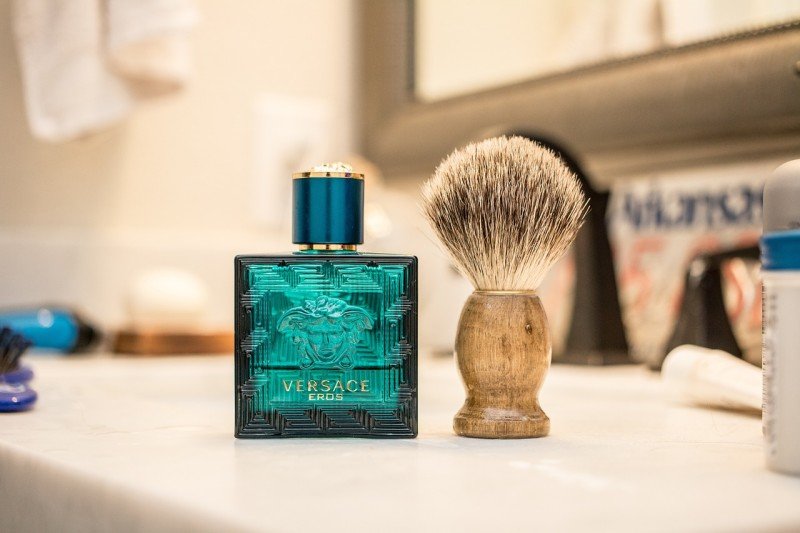In the world of grooming and skincare, selecting the best products is paramount. This is especially true when it comes to shaving, particularly if you're one of the many individuals who grapple with sensitive skin.
Opting for the wrong shaving soap can lead to many unpleasant consequences, including irritation, razor burns, and other skin-related woes.
That's precisely why it's crucial to have a firm grasp on what to look for when choosing a shaving soap tailored for sensitive skin.
Understanding Sensitive Skin
Sensitive Skin Defined: Sensitive skin is a widespread dermatological concern that plagues countless individuals. It's characterized by an increased sensitivity to specific substances or environmental factors that can trigger various issues, such as irritation, inflammation, and discomfort.
Those with sensitive skin often contend with symptoms like redness, itching, dryness, and an inclination toward rashes or hives. These symptoms frequently rear their heads after using certain skincare products, including soaps, lotions, and perfumes.
The Root Causes of Skin Sensitivity The origins of skin sensitivity are multifaceted. Genetics, environmental factors, and underlying medical conditions can all play a role. Individuals afflicted with eczema, rosacea, or psoriasis are especially prone to sensitive skin. Furthermore, exposure to harsh chemicals, allergens, or extreme temperatures can all catalyze skin sensitivity.
When selecting a shaving soap suitable for sensitive skin, it's imperative to steer clear of ingredients that could potentially exacerbate these issues. In the subsequent sections, we'll delve into the ingredients that should be sought after and those that should be avoided in shaving soap for sensitive skin.
Ingredients to Look for in Shaving Soap for Sensitive Skin
When navigating the vast landscape of shaving soaps, pay close attention to these essential ingredients that can work wonders for sensitive skin:
- Natural Ingredients with Soothing Properties: Many natural ingredients possess anti-inflammatory and soothing properties that can work wonders for calming sensitive skin. Look for shaving soaps that incorporate ingredients like aloe vera, chamomile, calendula, and lavender, all renowned for their skin-soothing attributes.
- Moisturizing Agents: Hydration is crucial for those with sensitive skin. Opt for shaving soaps infused with natural oils and butters such as coconut oil, shea butter, or jojoba oil to stave off dryness and irritation. Other advantageous ingredients include glycerin, a natural humectant that draws moisture to the skin, and vitamin E, replete with antioxidant properties that safeguard the skin from harm.
By opting for shaving soaps enriched with these natural and nourishing components, you can fortify your skin and ensure a comfortable shaving experience.
Ingredients to Avoid in Shaving Soap for Sensitive Skin
While choosing the right ingredients for your shaving soap can do wonders for sensitive skin, knowing which components to steer clear of is equally crucial.
In this section, we uncover the harsh chemicals commonly found in shaving soap and delve into the potential adverse effects of alcohol and specific essential oils on sensitive skin.
Harsh Chemicals: A Cautionary Tale
Parabens: Parabens are synthetic preservatives often found in skincare products, including shaving soap. However, they have garnered a notorious reputation for their potential to disrupt hormonal balance. Parabens can trigger irritation and exacerbate skin issues for individuals with sensitive skin. Opting for shaving soaps that proudly proclaim their paraben-free status is prudent.
Sulphates: Sulphates, such as sodium lauryl sulphate (SLS) and sodium laureth sulphate (SLES), are responsible for the rich lather in many grooming products. Unfortunately, they can strip the skin of natural oils, leaving it dry and susceptible to irritation. Sulphates can spell disaster for sensitive skin, leading to redness and discomfort.
Artificial Fragrances: Artificial fragrances might enhance the sensory experience of shaving, but they can also wreak havoc on sensitive skin. These fragrances often contain many undisclosed chemicals that can trigger allergic reactions, redness, and itching. Opt for shaving soaps that use natural scents or are labeled as fragrance-free to avoid this pitfall.
Alcohol: Drying Out Sensitive Skin
Alcohol is a common ingredient in many skincare products, including shaving soap. It's known for its quick-drying properties, which can be beneficial in some contexts. However, for sensitive skin, alcohol can be excessively drying and irritating. It strips away the skin's natural oils, leaving it vulnerable to redness, tightness, and discomfort. When selecting a shaving soap, consider options that are alcohol-free or contain minimal amounts to minimize the risk of drying out your skin.
Essential Oils: Proceed with Caution
While essential oils offer various benefits, some can be too harsh for sensitive skin. Two culprits to be particularly cautious of are:
Peppermint Oil: Peppermint oil, known for its refreshing and cooling properties, can be invigorating for some. However, it may also cause a burning or tingling sensation on sensitive skin. This can lead to irritation, redness, and discomfort during and after shaving. If your skin is sensitive, choosing shaving soaps without peppermint oil is advisable.
Eucalyptus Oil: With its potent aroma, Eucalyptus oil is often used in grooming products for its refreshing scent. Yet, like peppermint oil, it can be too harsh for sensitive skin. It has the potential to cause irritation and inflammation, making it wise to opt for shaving soaps that do not contain eucalyptus oil if you have sensitive skin.
How to Test Shaving Soap for Sensitivity
Choosing the suitable shaving soap for your sensitive skin isn't just about ingredients – it's also about ensuring compatibility through testing. In this section, we'll explore the importance of testing a new shaving soap and guide you through two effective methods: patch testing and skin reaction monitoring.
With these techniques, you can safeguard your skin from potential irritation and discomfort. Let's dive in.
The Importance of Testing
Testing a new shaving soap is critical in your skincare routine, especially if you have sensitive skin. While a product may boast skin-friendly ingredients, everyone's skin is unique, and what works for one person may not work for another. By testing, you can identify adverse reactions before committing to a full shave, preventing discomfort and irritation.
The Patch Testing Method
Application:
- Select a Small Area: Choose a small, inconspicuous area on your body to conduct the patch test. The inside of your wrist or behind your ear are good options.
- Prepare Your Skin: Ensure the chosen area is clean and free from other products.
- Apply the Shaving Soap: Apply a small amount of the lathered shaving soap to the test area. Make sure to follow the soap's instructions for lathering.
Duration:
- Wait Patiently: Allow the shaving soap to remain on your skin for at least a few hours, ideally overnight. This extended time frame helps ensure that potential reactions have time to develop.
Monitoring:
- Observe for Reactions: Check the test area periodically during and after the test period. Look for any signs of irritation, redness, itching, burning, or discomfort. If you notice any adverse reactions, wash off the soap immediately.
Skin Reaction Monitoring
Aside from the patch test, it's also essential to be vigilant while using the shaving soap on a larger area during your regular shaving routine. Here's how to monitor your skin for reactions:
- Pay Attention During Shaving: Be mindful of any unusual sensations or discomfort. If you experience redness, itching, or burning during the shave, discontinue using the soap immediately.
- After-Shave Inspection: After you've completed your shave, inspect your skin for any signs of sensitivity or irritation. This includes checking for redness or discomfort. If you notice any adverse reactions, switching to a different shaving soap is essential.
The Uniqueness of Individual Skin
It's crucial to recognize that everyone's skin is different, and what works for one person may not work for another. Factors such as genetics, allergies, and individual sensitivities can all play a role in how your skin reacts to different products. Therefore, even if a shaving soap is marketed as suitable for sensitive skin, it may still irritate some individuals. The key is to be attentive to your skin's unique needs and responses.
Shaving Soaps for Sensitive Skin
In our quest to achieve the perfect, irritation-free shave for sensitive skin, we've explored the nuances of understanding your skin, selecting the right ingredients, avoiding harsh chemicals, and even testing shaving soaps for sensitivity. Now, in the final leg of our journey, we'll unveil a curated selection of top shaving soaps that have been carefully chosen for their skin-friendly ingredients and exceptional performance. Say goodbye to redness, irritation, and discomfort as we introduce you to the best shaving soaps for sensitive skin.
Henry Cavendish All Natural Himalayan Shaving Soap
Key Ingredients: Coconut oil, glycerin, vitamin E
Benefits:
- Nourishes and moisturizes sensitive skin
- Creates a thick, protective lather
- Vitamin E offers antioxidant protection
Henry Cavendish All Natural Himalayan Shaving Soap is a powerhouse of natural goodness. Coconut oil and glycerin ensure your skin stays hydrated and well-nourished during and after shaving. Vitamin E provides additional protection against skin-damaging free radicals. This soap produces a thick, protective lather that safeguards your skin while delivering a close shave.
Badger Sensitive Skin Shaving Soap
Key Ingredients: Chamomile, calendula, shea butter
Benefits:
- Calms and soothes sensitive skin
- Reduces redness and irritation
- Shea butter adds a protective layer of moisture
Badger Sensitive Skin Shaving Soap is specially formulated for individuals with sensitive skin. Chamomile and calendula work together to calm and soothe any redness or irritation, making it an ideal choice for those prone to razor burn. Shea butter ensures your skin is well-protected and moisturized throughout your shave.
Our Final Thoughts
In the world of shaving for sensitive skin, knowledge is power. Armed with an understanding of your skin's needs, the right ingredients to look for, and the ones to avoid, you're well on your way to achieving a smooth, irritation-free shave. Test any new shaving soap for compatibility, as individual skin reactions vary.
We emphasize the importance of choosing natural and nourishing ingredients while avoiding harsh chemicals. Your skin deserves the best care possible, and by following these guidelines, you can ensure a better shaving experience.
Thank you for joining us to discover this guide to choosing the suitable shaving soap for sensitive skin. Happy shaving!


